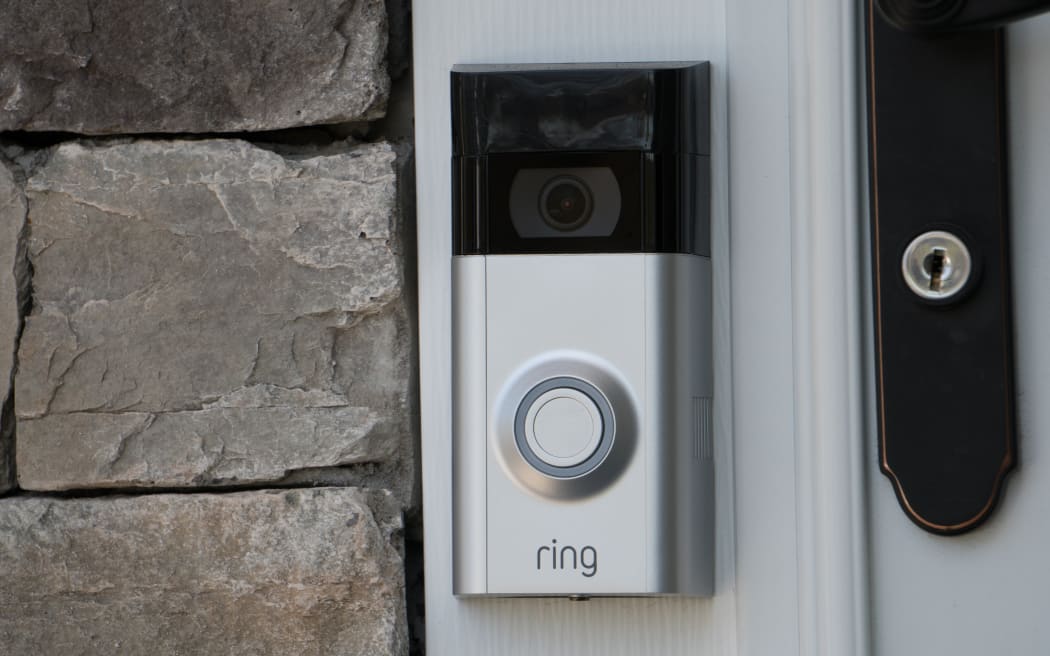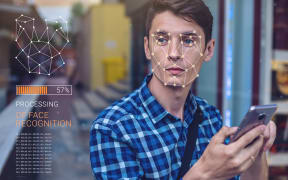
Ring doorbells have cameras in them and allow users to remotely connect to see who is at the door and talk to them through speakers. Photo: Brandon Klein/123 RF
A candid-camera style television show from tech giant Amazon using footage from smart doorbells is raising hackles in the United States and raising eyebrows in New Zealand.
It is the latest twist from the 'internet of things' - doorbells that cost a few hundred dollars and record surveillance footage that can be put online, or on TV, for all to see.
Amazon owns both the world's biggest selling smart doorbell Ring, and movie studio MGM.
Now MGM has made a TV show to launch later this month that combines clips from people's doorsteps.
Privacy hawk and US Democratic senator Ed Markey has long berated Ring for sharing footage with US police, and is now unimpressed at it turning surveillance videos into entertainment.
"Amazon must focus instead on making strong safety and accountability commitments to Ring users and ensure that neighbours aren't robbed of their privacy and civil liberties," US media quoted Markey in a statement.
MGM told Hollywood Reporter it gets permission for each clip from the doorbell owner and anyone in the clip.
Ring said: "Privacy is foundational to the show."
A Ring 3 doorbell, that lets you listen and speak to your visitors from anywhere and see them in high resolution, costs approximately $300 at Harvey Norman.
New Zealanders who use them could presumably get their clips included in the new TV show.
Consumer New Zealand chief executive Jon Duffy said consent was the key.
"My understanding is it has a range of about seven metres so it could be filming activity that's in a public space on a street.
"It comes down to whether someone's identifiable. If ... people are completely anonymised, or they consent to that footage being used in this way, then there's probably less of a problem."
The MIT Technology Review called the show a "brilliant but ominous viral marketing ploy" where every TV clip serves as an ad.
The Electronic Frontier Foundation said the show might be amusing but its ultimate purpose was to help spread surveillance culture down to household level.
In the UK last year, a judge ruled an Oxfordshire man was harassing his neighbour using Ring, not just due to the pictures but its capture of audio.
Ring has been under fire, since Amazon bought it for a billion-plus dollars in 2018, over what data it collects and what it does with it.
In a statement, Amazon told RNZ customer data was incredibly important to it and and it had been "very good stewards of peoples' data" across all of its businesses.
"Privacy is foundational to the [TV] show," it said.
Ring did not give police access to users' cameras, devices, device locations or live streams, it said.
Customers could share videos directly and were "in total control of the information they choose to share".
If police requested footage, such as with a warrant, Ring would carefully consider that. Emergency requests were rare, and closely scrutinised by legal specialists, Amazon said.
In the US, it partners with more than 2000 police departments, who can request people's doorbell footage and sometimes get it without their consent.
US police are enrolled in Ring's Neighbours app, which is used to share suspicious videos.
Ring TV already has customers' clips on its website. The TV show "looks like an attempt to cement societal acceptance of Ring", said Chris Gilliard, of the Harvard Kennedy School Shorenstein Centre.
The tech's long reach perturbs Duffy.
"We're attracted by that usefulness, but the devil can be in the detail around the data that's being shared.
"Plus, Amazon comes with remarkable scale. And if it does have the ability to access and use this data, you know, that raises interesting privacy concerns."
The New Zealand police said household closed circuit TV cover was becoming more prevalent and they often collected footage from it when canvassing an area after a serious crime.
Ring could provide footage from doorbells outside the US, but "Police does not have direct access to Ring doorbell footage via the Ring parent company, nor have we sought such access", police told RNZ.
Ring's website said non-US police must make requests through diplomatic, legal or US Justice Department channels - and if they got such a request, the company would then hold on to the data for longer while it was sorted out.
"Ring has access to videos captured by a Ring device only if the user has a current Ring Protect subscription (including a free trial) that was in place at the time of the event," it said.
It also says: "Emergencies. Ring reserves the right to respond immediately to urgent law enforcement requests for information in cases involving imminent danger of death or serious physical injury to any person."
Smart doorbells are also made by Chinese companies, among others. China leads the world in making and using web-connected devices that comprise the internet of things (IOT)and this has sparked security fears.
Duffy said there was a lot we don't know.
"These types of devices, as they access different types of social media platforms that originate from different jurisdictions, there will be different rules at play and there will be different relationships with security services ... So it is something to have in the back of your mind."







